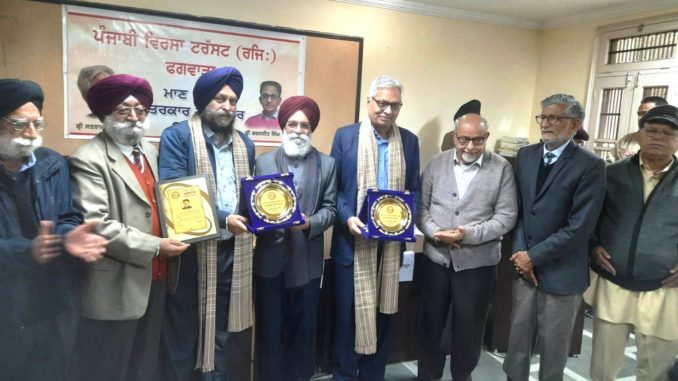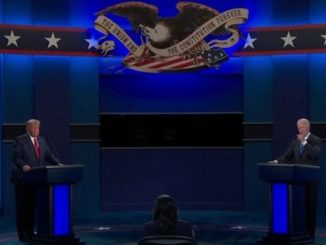
Punjabi Virsa Trust gives outstanding journalists awards to Manak and Bhullar, Manak calls Partition unnatural and a monumental blunder
By Jaswant Singh Gandam
PHAGWARA, INDIA (TIP): Calling ‘pattarkari’(journalism) ‘zameer’(soul) of society, popular Punjabi poet Padam Shri Surjit Patar, Chairman Punjab Arts Council, maintained here that in a way a journalist’s call of duty is more difficulty than that of a poet. Patar was addressing yesterday a gathering of prominent writers as Chief Guest at a function by Punjabi Virsa Trust Phagwara here for giving outstanding journalist award(‘Maan Matta PattarkarPurskar’) to senior journalists Satnam Manak, Executive Editor Ajit and Charanjit Singh Bhullar, staff reporter Punjabi Tribune.
Organised by Trust’s President Prof Jaswant Singh Gandam and General Secretary Gurmit Palahi ,the award carries a shawl, a citation, a memento and Rs 11,000 each.
Continuing, Patar argued that a journalist has to be clear, straight, factual and fearless in reporting issues on daily basis and, like poets, has no escape routes in the form of symbolic or metaphorical expressions. Asserting that a journalist plays a stellar role in changing public thinking, Patar said that a journalist has to be ‘bekhof’ and ‘bebaak’ in calling a spade a spade.
“In doing so, journalists have to face a lot of dangers and difficulties as they did in the days of Emergency and are doing so even now” ,he remarked, adding several writers also face these. ’Varvara Rao is still in jail,’ he said to substantiate it. Patar said, ”Democracy has four pillars ie judiciary, legislature, executive and press. The first three have in-built legal strength but the strength of media was only its words, logic and arguments .Though journalists don’t have any in-built legal strength for their safety but their words and writings become strength of peoples mind that act as shields. Actually, journalism and literature both play a big role in changing thoughts and mindsets of peoples.” He said that ‘pattarkari’ is our zameer while ‘shayari’(poetry) is our soul as it stirs in us a feeling for others ‘peeda’’(pain).
Patar also distinguished between a ‘khotisiyast’and ‘kharisiyast’, claiming that the former was vote-specific while the latter was issue-centric.
Claiming that a debate keeps going on his mind about merits and demerits of ‘Parvas’(migration abroad),Patar quoted his old and later stage couplets to drive home his point-“Jo badesanchrulde ne rozilayi, jadpartangeapnedesh kadi,/Kuchh ta sekange maa de sivey di agan,kuchhrukhan di chhanheth ja behnge”.
-“Shukar haipardeshai, Ik than hoyeparlok tau sah lain layi/bachan de layihainsihareyhakma tau… Je bolsohnebijiye/Je karamsohnebijiye/ta dhartianbeganian vi/apnian ban jandian’.
-“Je hakam hundechajj de/Merey putt pardesinahundey”.
Patar regaled audience by reciting his other poems.
Speaking on the occasion, Satnam Manak dubbed Partition as unnatural and a monumental blunder. Among founders of Hind-Pak Dosti Manch, Manak, while expressing grave concern over forced conversions of minorities in Pakistan, demanded implementation of Nehru-Liaqat Ali pact in toto for safeguarding interests and human rights of minorities in Pakistan, Bangladesh and India. “If it can not be done, then the unnatural division be undone and people given choice to settle wherever they opted for”, he pleaded.
Demanding MSP for farmers, Manak equated agriculture with army.”One provided food security while the other provided geographical security. They can’t be treated as per trade terms anywhere in the world and governments should shoulder the entire expenses of both.”
Referring to problems and concerns of journalists, Manak said that peoples problems were ‘sarokar’(concerns) of journalists.
Counting four major concerns of journalists, Manak said,” During freedom struggle, journalists duty was to highlight the movement. Contrary to film actor Kangna Ranaut’s condemnable utterance that 1947 Independence was a ‘bheekh’, the freedom dawned on us after a concerted struggle of one hundred year and supreme sacrifices made on every inch of the land. Now, in wake of 2014, journalists’ major concern was to uphold the values of that struggle in order to prevent present dispensation from handing over all sources of production to corporators. Journalists have to fight for defeating the sinister plans to convert parliamentary democracy into a unitary form of government sans its secular and federal character. India is not one nation, it is kaleidoscope of multi-national, multi-lingual, multi-cultural populace with variety and colorfulness which were its strength. The two-nation theory in Pakistan had played havoc and Hindu-Sikh minorities there have shrunk from 16% to 3-4% due to forced conversions. The silence of our PM and HM over it is intriguing. Hence, all journalists and writers must fight to keep up ‘sanjha-manjha’(common and colourful) character of our country and be watchdogs of peoples human rights, especially minorities”.
Dr Lakhvinder Johal, Secretary Punjab Arts Council, called journalists permanent opposition of the establishment. Dr Swaraj Singh dubbed migration from Punjab to abroad as the worst ever curse for Punjab. Dr SS Chhina and NRI Ashok Bhaura also spoke. Bhullar’s award was received by a local reporter Jasbir Chana. Gurmit Palahi’s book ‘Punjab Diary-2021’ was also released on this occasion. Trust’s President Prof Jaswant Singh Gandamand Sukhjit Starch and Chemicals Limited MD cum NGO stalwart KK Sardana welcomed and thanked the participants respectively.




Be the first to comment